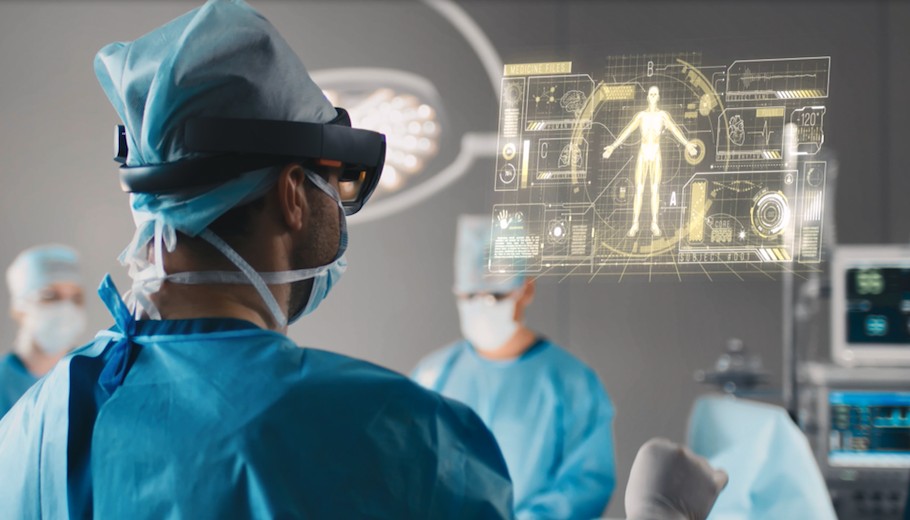Artificial intelligence (AI) is gradually becoming an indispensable tool in healthcare. With its ability to process large amounts of data quickly and accurately, AI has opened up significant potential in analyzing medical data and supporting disease diagnosis. It not only helps doctors improve their efficiency but also provides optimal treatment solutions for patients.
AI in medical data analysis
In the healthcare environment, data is an extremely valuable resource, but efficiently utilizing it is not simple. Current AI systems can collect, analyze, and learn from millions of different health data points, ranging from medical records to test results, and medical images like CT or MRI scans. This ability allows AI to uncover hidden patterns that humans might not be able to detect.
For instance, AI has been applied to analyze images from medical imaging devices to detect early signs of abnormalities, such as small tumors that the human eye might overlook. Moreover, AI helps predict the progression of diseases, enabling doctors to make accurate and timely treatment decisions.
Automated disease diagnosis

AI is also playing a crucial role in automated diagnosis. Machine learning algorithms have been trained on vast amounts of medical data to learn and provide diagnostic results. For example, AI can analyze patient symptoms, combine them with clinical data, and offer diagnoses and treatment recommendations. This is especially useful in emergency situations, where time is of the essence.
A notable example is AI in cancer diagnosis. AI systems have helped improve early detection rates for skin, lung, and breast cancers, with accuracy on par with or even exceeding that of medical experts. By using data on medical history, imaging results, and test outcomes, AI can significantly shorten diagnosis time, increasing the chances of successful treatment.
The benefits of AI in treatment
In addition to supporting diagnosis, AI plays an essential role in disease treatment. AI systems can analyze treatment data from thousands of patients to provide the optimal treatment plan for each specific case. This minimizes the risk of side effects and improves treatment efficacy.
For instance, AI can be used to personalize cancer treatment based on the genetic profile of individual patients. AI also helps doctors monitor and adjust medication dosages in real time, ensuring the treatment process is constantly optimized for the best results.
Existing AI technologies and applications in healthcare

The rapid development of AI has led to the creation of numerous specific technologies and applications in the healthcare sector. Below are some prominent AI technologies and applications currently widely used in medicine:
1. IBM Watson Health
IBM Watson is one of the most well-known AI technologies in healthcare. With its ability to process large volumes of data and learn from medical literature, Watson can provide precise treatment recommendations by analyzing symptoms, medical history, and the latest scientific studies. This technology has been applied in cancer, cardiology, and other fields.
2. Google DeepMind Health
Google’s DeepMind has also made significant strides in applying AI to healthcare. This technology is primarily used in medical image analysis and helps detect conditions such as retinal damage and acute kidney failure. DeepMind has partnered with major hospitals to develop AI systems that support doctors in diagnosis and treatment.
3. Aidoc
Aidoc is an AI system specialized in analyzing medical images such as X-rays and CT scans. It helps quickly detect abnormalities like brain hemorrhages, fractures, or tumors. Aidoc is used in hospitals to assist doctors in making swift decisions, especially in emergency cases.
4. PathAI
PathAI is an AI application focused on cancer diagnosis through histopathology analysis. This system improves accuracy in analyzing abnormal cells, leading to more precise diagnoses of various types of cancer. This application is contributing to better cancer diagnosis and treatment processes worldwide.
5. Zebra Medical Vision
Zebra Medical Vision is an AI platform offering automated medical image analysis services. This platform supports doctors in detecting conditions like osteoporosis, cardiovascular diseases, and even cancer. Zebra Medical Vision has partnered with many major healthcare organizations to provide AI-powered diagnostic tools.
6. Buoy Health
Buoy Health is an AI chatbot that helps users self-diagnose symptoms based on the information they provide. This application helps users identify basic health conditions and guides them to see a doctor when necessary. Buoy Health is an excellent example of using AI for personal health management.
7. Tempus
Tempus is an AI platform focused on analyzing genetic data and medical records to provide personalized treatment solutions, particularly in cancer care. Tempus technology analyzes genetic information in-depth and combines it with clinical data to suggest the best treatment options for each patient.
8. CloudMedx
CloudMedx uses AI to aggregate and analyze medical data, offering predictions about patients’ health conditions. This system can be integrated into electronic health records (EHR) to assist doctors in making clinical decisions. AI from CloudMedx helps improve the accuracy and effectiveness of treatment decisions.
Challenges and the future of AI in healthcare
Although AI has achieved significant milestones in healthcare, its widespread adoption still faces several challenges. Privacy and security issues regarding medical data are among the major concerns. Moreover, ensuring the reliability and transparency of AI decisions is crucial for doctors to trust and use AI in their daily work.
However, with the pace of technological development, AI in healthcare promises to continue bringing new breakthroughs. From supporting diagnosis and treatment to personal health management, AI is gradually transforming how we care for our health, offering more efficient, faster, and more accurate solutions.




